Home » Archives for August 2013
Letter to lawmakers lays out objective
Posted by Unknown
Zeta-Jones and Douglas separate
Posted by Unknown
Alec Baldwin pins paparazzo to car
Posted by Unknown
31 most beautiful sights on Earth
Posted by Unknown
Good luck, middle class
Posted by Unknown
Editor's note: John D. Sutter is a columnist for CNN Opinion and head of CNN's Change the List project. Follow him on Twitter, Facebook or Google+. E-mail him at ctl@cnn.com.
(CNN) -- Let's play a little game.
Which of the following signs did protestors hold at the March on Washington, 50 years ago this week, and which were held up this year by fast-food workers:
1. "WE MARCH FOR HIGHER MINIMUM WAGES COVERAGE FOR ALL WORKERS NOW!"
2. "WE ARE WORTH MORE"
3. "I AM A MAN"
4. "WE MARCH FOR JOBS FOR ALL A DECENT PAY NOW!"
The exclamation points, which apparently were more popular in the 1960s (despite what Twitter would have you believe!!!), are your best clue.
 John D. Sutter
John D. Sutter Signs one and four are from 1963. Two and three are from 2013.
Fifty years later, it's easy to forget that the full name of the 1963 "March on Washington" was actually "The March on Washington for Jobs and Freedom."
Sutter: 99 must-reads on economic inequality
But flip through some pictures from that rally, where Martin Luther King Jr. gave his famous "I Have A Dream" speech and where civil rights leaders, to borrow his words, bent the arc of history towards justice and greater equality, and you'll see protest signs that put the economy as a front-and-center issue, just as it is now.
"CIVIL RIGHTS PLUS FULL EMPLOYMENT EQUALS FREEDOM."
 Fast food workers demand fair pay
Fast food workers demand fair pay President Obama, in commemorating the 50th anniversary of that march this week, smartly picked up on the theme that economic equality is "the great unfinished business" of King's vision for a just and fair America.
"...[A]s we mark this anniversary, we must remind ourselves that the measure of progress for those who marched 50 years ago was not merely how many blacks had joined the ranks of millionaires; it was whether this country would admit all people who were willing to work hard, regardless of race, into the ranks of a middle-class life," Obama said Wednesday. "The test was not and never has been whether the doors of opportunity are cracked a bit wider for a few. It was whether our economic system provides a fair shot for the many, for the black custodian and the white steelworker, the immigrant dishwasher and the Native American veteran."
The subtext of his argument: Class may be the new race.
It's not that all battles for racial equality have been won -- they haven't -- or that we live in a post-racial society. But, in some remarkable and troubling ways, class has become an increasingly significant barrier to equality in modern America. The gap between rich and poor has been growing in the United States since the late 1970s, and our level of income inequality, one proxy measure for that gap, is now on par with many sub-Saharan African countries.
Sutter: Who cares about the economy? ... You!
It's become more difficult for the poor to move up into the middle class and more difficult for the middle to dig in its heels to stop from slipping into poverty.
The American mantra of "work hard and you'll get ahead" is not always enough to sustain people. It's harder now to secure a financial future.
This is the theme that underlies much of what's happening in America today. And it's something that goes back much farther than the recent recession.
The fast-food workers, for example, who scheduled demonstrations across the country on Thursday, are frustrated by the fact that they can't make ends meet on $7.25 per hour. If you doubt whether that's true, please take a look at one fast-food worker's budget. Some workers, as Forbes reports, have to choose between paying for rent or food. "Should I pay my light bill (or) should I pay my gas?" one fast-food worker asks in this CNNMoney video. "I never can pay it all at once."
"Right now the gas is off," she says.
The workers demand a living wage of $15 per hour.
I'm not sure what the fair wage would be. That's the subject for another column...or perhaps a book. But I do know that, as The Atlantic reports, fast-food workers in Australia make $14.50 an hour, about twice the U.S. minimum wage.
And burgers haven't become too expensive Down Under.
Some context is helpful for understanding that movement as well.
The U.S. minimum wage is actually lower than it was in the late 1960s. Five years after King's speech in front of the Lincoln Memorial, the federal minimum wage, when converted into 2013 dollars, was $10.70, compared to $7.25 now. (The nominal minimum wage, according to the Congressional Research Service, was only $1.60 per hour in 1968. The $10.70 amount is adjusted for inflation).
Sutter: White House should pay its interns
Education is another example. There's evidence poverty is a better indicator of educational achievement than race.
"According to a 2011 research study by Stanford sociologist Sean Reardon, the test-score gap between the children of the poor (in the 10th percentile of income) and the children of the wealthy (in the 90th percentile) has expanded by as much as 40% and is now more than 50% larger than the black-white achievement gap -- a reversal of the trend 50 years ago," Sarah Garland writes for The Atlantic.
"Underprivileged children now languish at achievement levels that are close to four years behind their wealthy peers."
Four years behind their peers.
Just because of their income.
That challenges the very notion of who we are as Americans.
We see ourselves as a middle-class country -- a place where anyone can work hard and succeed. And many do. We're a country of fighters.
But it's become more difficult for the non-rich to make it.
The country has made great strides toward racial equality since the March on Washington for Jobs and Freedom. But, in the 50 years since King's speech, economic justice seems to have become the more distant dream.
See this painful beauty pageant oops
Posted by Unknown
Tylenol users get a new warning
Posted by Unknown
20 top Letterman moments
Posted by Unknown
 SET EDITION: U.S. INTERNATIONAL MÉXICO ARABIC TV: CNN CNNi CNN en Español HLN Sign up Log in Home TV & Video CNN Trends U.S. World Politics Justice Entertainment Tech Health Living Travel Opinion iReport Money
SET EDITION: U.S. INTERNATIONAL MÉXICO ARABIC TV: CNN CNNi CNN en Español HLN Sign up Log in Home TV & Video CNN Trends U.S. World Politics Justice Entertainment Tech Health Living Travel Opinion iReport MoneyWhy cyberattacks from Syria matter
Posted by Unknown
Editor's note: James Lewis is director and senior fellow of Technology and Public Policy Program at the Center for Strategic and International Studies.
(CNN) -- On Tuesday afternoon, the New York Times website experienced wide outage for several hours. Who has the nerve and ability to take down one of the most iconic newspapers in the world?
The Syrian Electronic Army, which is loyal to Syrian President Bashar al-Assad, takes responsibility for the hack. This is not the first time the Syrian Electronic Army has attacked news organizations. The Washington Post, AP and others have been targeted in recent months as well.
If the New York Times saw Syrian activists spray-painting slogans on its building, it could summon the minions of the law to detain them. But if you live far away in a place where American law does not apply, you are safe. It does not take much skill to intrude in cyberspace, and you can find free tools on the Internet that will let you stage a protest or an attack.
When you log on to the Internet, you can send packets of digital data around the world in seconds. The speed of global connectivity gives the illusion that there are no borders. But this is not true. There are borders in cyberspace, they are just badly defended.
The combination of high speeds, global reach and weak defenses means that someone sitting in Damascus or Tehran can take action in New York or Australia as easily as they could against the building across the street -- perhaps even easier as they won't have to leave their chair.
The Syrian Electronic Army's attacks are a form of protest against Western media's portrayal of the Assad regime. Most experts think the Syrian Electronic Army is not the Syrian government, but "patriotic hackers" who support it. This makes them harder to control and harder to find. The Syrian Electronic Army takes public diplomacy to a new level, letting individuals make their voices known on issues as easily as a government.
What we have seen from the Syrian Electronic Army is political action and sometimes political theater. Hacker groups like Anonymous, WikiLeaks or the Syrian Electronic Army have a symbiotic relationship with media that helps turn minor exploits into front-page news. The Syrian Electronic Army likes to go after the media because this is one way to make sure your message is heard. The Syrian Electronic Army's message to the Western media is one of scorn, ridicule and belittlement.
This week's attack showed more skill than earlier episodes. It resembled a cyber attack made by Iran against dissidents in 2011. Perhaps the Iranians are helping the SEA in cyberspace, but it's more likely that they provided inspiration.
The Syrian Electronic Army broke into the Australian company that hosts The Times' website (called a registrar) and changed its Internet addresses. This redirection was invisible to users who tried to visit NYTimes.com -- they either couldn't connect or were sent to another website controlled by the Syrians. The hackers got inside the target network and made some fundamental changes to how it worked. Some security experts have pointed out that The Times made its own networks vulnerable because of a "misstep" and as a result its website was easier to hack.
So far, the Syrian Electronic Army's actions have been embarrassing rather than damaging. The attackers probably don't know how to carry out a more destructive attack. But with time they could easily learn.
The Syrian Electronic Army's hacking won't change the outcome of the conflict in Syria (whatever that will be), but we don't want to discount the political effect of their actions. Some audiences in the Middle East likely enjoy seeing Western institutions humbled, and the Syrian Electronic Army is helping to dispel a sense of powerlessness against the Western behemoth. It boosts morale.
We also don't want to discount the risks. If the Syrian Electronic Army can slip by feeble defenses to make fun of the media, someone else might be able to get in and cause more serious disruption. There are a lot of reasons why the Syrian Electronic Army might choose not to launch this kind of crippling cyber attack, but the strength of our defense isn't one of them.
There are things that companies can do to protect themselves. Australia's Signals Directorate, the equivalent of NSA, has a list of mitigation strategies that would have block most of the Syrian Electronic Army does, but they aren't well known in the U.S.
The global Internet brings tremendous, benefit but the threats are growing faster than our defenses. It's a vulnerable place with few rules. Until this is changed, hacks on The New York Times and others will be the norm, not the exception.
Follow us on Twitter @CNNOpinion.
Join us on Facebook/CNNOpinion.
Obama's 3 choices on Syria
Posted by Unknown
Editor's note: Aaron David Miller is a vice president and distinguished scholar at the Woodrow Wilson International Center for Scholars and was a Middle East negotiator in Democratic and Republican administrations. Follow him on Twitter.
(CNN) -- Among the most enduring urban legends about high-level policy-making in the U.S. government is the proverbial memo with three options: 1. do nothing; 2. do everything; 3. find a middle ground and muddle through.
And yet in truth, Barack Obama really does have only three options in Syria. It appears that the president, rightly the avoider-in-chief when it comes to Syria, has chosen option three, the least bad alternative. And here's why.
Do nothing
 Aaron David Miller
Aaron David Miller This isn't really an option. Forget the fact that the president a year ago drew his own red line against Bashar al-Assad's use of chemical weapons. Disregard the reality that this is reportedly the largest single deployment of chemical weapons since Saddam Hussein used them against the Kurds in 1988; dismiss the fact that 100,000 Syrians have died in this civil conflict; and the president is accused of fiddling, Nero-like, while Syria burns.
Just focus on the events of the past five days in Washington. What has been emanating from administration officials both on and off the record is the most well-advertised and telegraphed military action in the history of modern warfare. Rarely do we get this kind of preview of the operation, its size and character.
Combine that with the Secretary of State John Kerry's brief but powerful statement of moral outrage the other day and the president's PBS interview, and you get as authoritative a commitment to strike as is humanly imaginable.
Indeed, forceful statements and actions of the past few days have now constituted their own red line. And if the president doesn't enforce it, he will be truly damaged goods when it comes to foreign policy for the remainder of his term.
Neither his regional allies (Israel and the Saudis) nor his adversaries (Iran, Hezbollah, Russia) will find him credible or believable. As it is now, everyone says no to the U.S. without much cost or consequence.
Do everything
From the beginning, Sens. John McCain and Lindsay Graham and a whole host of liberal interventionists and neoconservatives outside the government have repeatedly called for a more robust policy on Syria, even suggesting that the president, by not acting sooner, enabled all of this misery to unfold. Syria, the president's critics maintain, is a major threat to U.S. interests -- and to our allies in the region -- and only a takedown of the al-Assad regime through supporting the opposition and direct application of U.S. military power will begin to address the problem.
The argument has not called for boots on the ground but for extensive use of no-fly zones, the use of U.S. air and missile power to degrade the regime and military support for the opposition.
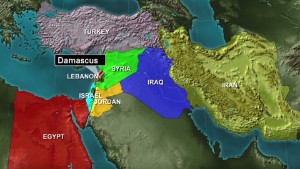 Obama: Syria strikes would be limited
Obama: Syria strikes would be limited President Obama has wisely and willfully avoided this approach. And he continues to avoid it now. The reason has to do with the general problem of an open-ended military commitment and the lack of correlation between the use of U.S. military power and its relation to the end state.
Syria is in the throes of a brutal civil war. The opposition is composed of more than 1,000 disparate rebel groups, the most effective allied with al Qaeda and other Sunni extremists. A victory of the latter would be a blow to U.S. interests. Ousting al-Assad won't be cheap or easy. It took eight months to get rid of Libya's Moammar Gadhafi, and he had no weapons of mass destruction, no serious air defenses or military capacity and no credible allies. And look at the end result: a post-Gadhafi environment in which there are too many guns, grievances and regional rivalries and no credible central authority.
And Libya pales in comparison with Syria's complexities. Devising a serious military strategy to get rid of al-Assad -- serious weapons for the rebels; no-fly or -drive zones; and sustained air/missile strikes against Syrian military units, infrastructure and leadership targets -- also means U.S. responsibility for what follows. Barack Obama has avoided this option because he rightly doesn't want America getting stuck with the check for Syria.
Muddle through
The option the U.S. is likely to undertake -- focused more narrowly on trying to deter the Syrians from using chemical weapons again and degrading al-Assad's military capacity in the process -- is far from ideal. Although I think the administration's military actions will be far more devastating than the limited strikes being talked about, it is unlikely to change the arc of the battlefield balance.
There are other downsides, too. Once the glass ceiling against the use of force is broken, the expectations and pressures to use it again will grow. There's always the danger too of a response by Hezbollah or Syria against Israel, however unlikely. And sooner or later, al-Assad will commit some other horror that will require another U.S. response. This kind of episodic intervention without a real strategy can undermine American credibility, too.
To be sure, there are real risks in acting on option three, and Obama most assuredly is a reluctant warrior. Indeed, in view of the parliamentary opposition to British Prime Minister David Cameron's willingness to join the U.S., he may be a lonely warrior, too. But he's going to war with Syria nonetheless. Al-Assad's apparent use of chemical weapons, the president's own words and those of others in his administration leave him no other choice.
Follow @CNNOpinion on Twitter.
Join us at Facebook/CNNOpinion.
N.J. texting ruling not what you think
Posted by Unknown
Editor's note: Marc J. Randazza is a Las Vegas-based First Amendment attorney. He is licensed to practice in Arizona, California, Florida, Massachusetts and Nevada. He is the editor of the law blog, The Legal Satyricon.
(CNN) -- The headlines and blogs are all abuzz with the latest news: If a driver who's texting gets in an accident and you sent the text, you can be arrested! Terrible, right?
Actually, it's not true, despite what you may have been told by people who have seen two episodes of some lawyer show and think they are qualified to be legal analysts. Such ignorance about the law feeds misinformation that grows on itself, doubles back and makes us all dumber.
For people like me, lawyers, that is a wonderful thing. Why? Because people who have no idea what they are talking about wind up making simple legal situations complicated, ramping up the billable hours for all of us.
 Marc Randazza
Marc Randazza Remember the McDonald's hot-coffee lawsuit? That case, maligned from coast to coast, stands in the public mind as the one that says, "If you are stupid enough to spill hot coffee on yourself, you deserve hundreds of millions of dollars."
Anyone who knows anything about the law will tell you that the real ruling came down for the plaintiff because McDonald's had been warned time and again that it was going to hurt somebody if it didn't do something about the scalding temperature at which it served its coffee. But, in the name of more profits, it ignored the warnings. Even thereafter, McDonalds had the opportunity to pay the 81-year-old woman's medical bills -- she was seriously injured, with third-degree burns -- but it acted arrogantly.
McDonald's did something wrong. When it was called to task for it, the punishment had to fit the defendant. Fining McDonalds $1,000 just wasn't going to do it. Hitting McDonalds with a huge multimillion-dollar settlement? That did it. (The injured woman's $2.86 million jury award was later reduced, however, by a judge to $640,000.)
So what has that to do with the New Jersey texting case?
 Viewfinder - Texting While Driving
Viewfinder - Texting While Driving  Famed director's new PSA on texting
Famed director's new PSA on texting  Don't walk and text
Don't walk and text The New Jersey texting case will likely lead to more boneheads who get their legal acumen from "My Cousin Vinny" expounding on its meaning. This chorus shrieks that the New Jersey decision makes you liable for sending a text. But the court actually held that the person doing the texting was not liable in this instance.
The court held that theoretically, someone could be held liable for sending a text to a driver. But the ruling was very clear, and very, very limited:
"We hold that the sender of a text message could potentially be liable if an accident is caused by texting but only if the sender knew or had special reason to know that the recipient would view the text while driving and thus be distracted."
In other words, yes, you can be held responsible if you cause an accident by sending a text message. But only if you knew that the recipient would look at the text message while driving. If you had any reason to have any doubt in your mind, then you will likely not be held liable.
So if you send a text message to someone, you need not then call your lawyer or your insurance company. But if you send someone a text message and they respond back "driving, leave me alone" and then you keep sending text messages, perhaps you might be found liable.
The only thing that is certain is that this case, which makes plenty of sense, will serve to continue to allow the common law to grow, while those who would like to bring ignorance to our knowledge of the legal system will continue to succeed.
Follow us on Twitter @CNNOpinion.
Join us on Facebook/CNNOpinion.
Justice for Down syndrome man
Posted by Unknown
Editor's note: David M. Perry is an associate professor of history at Dominican University in River Forest, Illinois. You can see more of his writing at his blog: How Did We Get Into This Mess? and follow him on Twitter.
(CNN) -- One day last January, Robert Ethan Saylor, a 26-year-old man with Down syndrome, went to see the movie "Zero Dark Thirty." When it was over, Saylor briefly left the theater, then decided to return and see it again. The manager called security because Saylor didn't pay, and three off-duty deputies, moonlighting at the mall, came in to confront him.
According to Frederick County, Maryland, police statements, he swore at them and refused to leave. The deputies tried to remove him, despite Saylor's caretaker's warnings and pleas for them to wait and let her take care of it. What happened next is a little unclear, but witnesses say the deputies put Saylor on the floor, held him down and handcuffed him. Saylor, called Ethan by his family, suffered a fracture in his throat cartilage. He died of asphyxiation.
 David Perry
David Perry The death was ruled a homicide, but a grand jury failed to indict the deputies and they returned to work without charges.
My son has Down syndrome, so I have been following this case closely. But for months, it seemed as if only people in the disability community cared about it.
Petitions for independent investigations sputtered out with just a few hundred votes. Local reporting on the case never made a splash in national media. Meanwhile, the Frederick County sheriff investigated his men's conduct, ruled they had followed procedure correctly, and tried to move on.
Police violence against people with disabilities is not uncommon, but the cases don't seem to get a lot of publicity. Most people see the disabled as, at best, passive victims, objects to care for, perhaps to love, but not people with whom we automatically identify.
This is a mistake. We are all only temporarily able-bodied. Accidents, illness, and age wait for us all. What happened to Ethan Saylor could happen to you.
In July, his death began to get more attention. Heather Mizeur, a member of the Maryland House of Representatives and candidate for governor, seized on Saylor's story and called for new training for law enforcement. Debra Alfarone, an investigative journalist in Washington, began to broadcast and write about the case. A petition asking Gov. Martin O'Malley to investigate went viral in mid-August, garnering 300,000 signatures in just a week. This petition fueled a renewed, suddenly national, media narrative. Ethan Saylor and #JusticeForEthan are now an official cause.
We are all only temporarily able-bodied. Accidents, illness, and age wait for us all. What happened to Ethan Saylor could happen to you.David Perry
What's next? An outside investigation either by the Justice Department or as part of a civil lawsuit might piece together the chain of events from the moment deputies confronted Saylor to his death on the cinema floor. We need an unbiased assessment of responsibility, not just to help the Saylor family understand -- although that's important -- but to help all of us understand what went wrong. When law enforcement officers encounter people with disabilities, things can go wrong very easily.
Dennis Debbaudt trains police on how to respond to people with intellectual disabilities, and argues that such cases require special tactics.
First, he says, law enforcement officers should ensure that they, bystanders and the person with a disability are all out of danger. If the situation is safe, Debbaudt says, officers need to take all the time that's necessary to resolve the problem without force. He tells officers that if the person with a disability isn't "aggressing into the officer's space," then there's generally no good reason to "aggress into theirs."
Saylor's aide was asking the officers to wait, rather than handcuff and arrest him, because he hated to be touched. To wait sounds a lot like common sense. According to both the officers' and witnesses' statements, no one seems to have been in danger, a deputy initiated contact only after Saylor swore at them, and witnesses report that the officers remained calm throughout.
At worst, taking more time would have inconvenienced other moviegoers -- who, in any event, did not see their movie because of the death. I can't say whether the deputies did anything wrong; in fact, they may have followed their typical procedures to the letter. But with just a little more patience, Ethan Saylor could still be alive.
This tragedy raises questions about how people with disabilities fit into society.
The Americans with Disabilities Act suggests that employers must offer reasonable accommodations to workers with disabilities. That standard has entered the broader culture, even as we repeatedly litigate the meaning of "reasonable." Would it have been reasonable to let Saylor watch the movie for free? Would it have been reasonable to try to talk it out for 10 minutes, 30 minutes, an hour, delaying the start of a movie? Would it be reasonable to bar admission to people with disabilities?
Making sure we figure out how to safely include people with disabilities throughout our community matters to everyone. Here's a very different story with an equally tragic ending.
On August 2, John Wrana, a 95-year-old World War II veteran in Park Forest, Illinois, was scared. He didn't want to go to the hospital for surgery, because he didn't want to end up on life support. The staff at his assisted living community decided to involuntarily commit him and called the police. He threatened the staff with a shoehorn and a cane. The police came. They shot him with a Taser and and fired beanbag rounds at him. He died.
The Park Forest police say, "Attempts were made verbally to have the resident comply with demands to drop the articles, to no avail." The police claim he had a kitchen knife, but the family disputes this, saying there was no knife in the old man's room before the incident.
Unlike Robert Ethan Saylor, John Wrana was not born with a disability. He made it through WWII with his body intact. But he was only temporarily able-bodied, then age caught up with him. Once in the world of disability, confused and stripped of his power to govern his body, he encountered the police and was killed.
Disability rights are universal human rights, not abstract principles. But if it takes a personal reason to care about rights for the disabled, remember this: You might need them someday.
Follow us on Twitter @CNNOpinion.
Join us on Facebook/CNNOpinion.
Is 'class' the new 'race'?
Posted by Unknown
Editor's note: John D. Sutter is a columnist for CNN Opinion and head of CNN's Change the List project. Follow him on Twitter, Facebook or Google+. E-mail him at ctl@cnn.com.
(CNN) -- Let's play a little game.
Which of the following signs did protestors hold at the March on Washington, 50 years ago this week, and which were held up this year by fast-food workers:
1. "WE MARCH FOR HIGHER MINIMUM WAGES COVERAGE FOR ALL WORKERS NOW!"
2. "WE ARE WORTH MORE"
3. "I AM A MAN"
4. "WE MARCH FOR JOBS FOR ALL A DECENT PAY NOW!"
The exclamation points, which apparently were more popular in the 1960s (despite what Twitter would have you believe!!!), are your best clue.
 John D. Sutter
John D. Sutter Signs one and four are from 1963. Two and three are from 2013.
Fifty years later, it's easy to forget that the full name of the 1963 "March on Washington" was actually "The March on Washington for Jobs and Freedom."
Sutter: 99 must-reads on economic inequality
But flip through some pictures from that rally, where Martin Luther King Jr. gave his famous "I Have A Dream" speech and where civil rights leaders, to borrow his words, bent the arc of history towards justice and greater equality, and you'll see protest signs that put the economy as a front-and-center issue, just as it is now.
"CIVIL RIGHTS PLUS FULL EMPLOYMENT EQUALS FREEDOM."
 Fast food workers demand fair pay
Fast food workers demand fair pay President Obama, in commemorating the 50th anniversary of that march this week, smartly picked up on the theme that economic equality is "the great unfinished business" of King's vision for a just and fair America.
"...[A]s we mark this anniversary, we must remind ourselves that the measure of progress for those who marched 50 years ago was not merely how many blacks had joined the ranks of millionaires; it was whether this country would admit all people who were willing to work hard, regardless of race, into the ranks of a middle-class life," Obama said Wednesday. "The test was not and never has been whether the doors of opportunity are cracked a bit wider for a few. It was whether our economic system provides a fair shot for the many, for the black custodian and the white steelworker, the immigrant dishwasher and the Native American veteran."
The subtext of his argument: Class may be the new race.
It's not that all battles for racial equality have been won -- they haven't -- or that we live in a post-racial society. But, in some remarkable and troubling ways, class has become an increasingly significant barrier to equality in modern America. The gap between rich and poor has been growing in the United States since the late 1970s, and our level of income inequality, one proxy measure for that gap, is now on par with many sub-Saharan African countries.
Sutter: Who cares about the economy? ... You!
It's become more difficult for the poor to move up into the middle class and more difficult for the middle to dig in its heels to stop from slipping into poverty.
The American mantra of "work hard and you'll get ahead" is not always enough to sustain people. It's harder now to secure a financial future.
This is the theme that underlies much of what's happening in America today. And it's something that goes back much farther than the recent recession.
The fast-food workers, for example, who scheduled demonstrations across the country on Thursday, are frustrated by the fact that they can't make ends meet on $7.25 per hour. If you doubt whether that's true, please take a look at one fast-food worker's budget. Some workers, as Forbes reports, have to choose between paying for rent or food. "Should I pay my light bill (or) should I pay my gas?" one fast-food worker asks in this CNNMoney video. "I never can pay it all at once."
"Right now the gas is off," she says.
The workers demand a living wage of $15 per hour.
I'm not sure what the fair wage would be. That's the subject for another column...or perhaps a book. But I do know that, as The Atlantic reports, fast-food workers in Australia make $14.50 an hour, about twice the U.S. minimum wage.
And burgers haven't become too expensive Down Under.
Some context is helpful for understanding that movement as well.
The U.S. minimum wage is actually lower than it was in the late 1960s. Five years after King's speech in front of the Lincoln Memorial, the federal minimum wage, when converted into 2013 dollars, was $10.70, compared to $7.25 now. (The nominal minimum wage, according to the Congressional Research Service, was only $1.60 per hour in 1968. The $10.70 amount is adjusted for inflation).
Sutter: White House should pay its interns
Education is another example. There's evidence poverty is a better indicator of educational achievement than race.
"According to a 2011 research study by Stanford sociologist Sean Reardon, the test-score gap between the children of the poor (in the 10th percentile of income) and the children of the wealthy (in the 90th percentile) has expanded by as much as 40% and is now more than 50% larger than the black-white achievement gap -- a reversal of the trend 50 years ago," Sarah Garland writes for The Atlantic.
"Underprivileged children now languish at achievement levels that are close to four years behind their wealthy peers."
Four years behind their peers.
Just because of their income.
That challenges the very notion of who we are as Americans.
We see ourselves as a middle-class country -- a place where anyone can work hard and succeed. And many do. We're a country of fighters.
But it's become more difficult for the non-rich to make it.
The country has made great strides toward racial equality since the March on Washington for Jobs and Freedom. But, in the 50 years since King's speech, economic justice seems to have become the more distant dream.
Obama is mulling the least bad option
Posted by Unknown
Editor's note: Aaron David Miller is a vice president and distinguished scholar at the Woodrow Wilson International Center for Scholars and was a Middle East negotiator in Democratic and Republican administrations. Follow him on Twitter.
(CNN) -- Among the most enduring urban legends about high-level policy-making in the U.S. government is the proverbial memo with three options: 1. do nothing; 2. do everything; 3. find a middle ground and muddle through.
And yet in truth, Barack Obama really does have only three options in Syria. It appears that the president, rightly the avoider-in-chief when it comes to Syria, has chosen option three, the least bad alternative. And here's why.
Do nothing
 Aaron David Miller
Aaron David Miller This isn't really an option. Forget the fact that the president a year ago drew his own red line against Bashar al-Assad's use of chemical weapons. Disregard the reality that this is reportedly the largest single deployment of chemical weapons since Saddam Hussein used them against the Kurds in 1988; dismiss the fact that 100,000 Syrians have died in this civil conflict; and the president is accused of fiddling, Nero-like, while Syria burns.
Just focus on the events of the past five days in Washington. What has been emanating from administration officials both on and off the record is the most well-advertised and telegraphed military action in the history of modern warfare. Rarely do we get this kind of preview of the operation, its size and character.
Combine that with the Secretary of State John Kerry's brief but powerful statement of moral outrage the other day and the president's PBS interview, and you get as authoritative a commitment to strike as is humanly imaginable.
Indeed, forceful statements and actions of the past few days have now constituted their own red line. And if the president doesn't enforce it, he will be truly damaged goods when it comes to foreign policy for the remainder of his term.
Neither his regional allies (Israel and the Saudis) nor his adversaries (Iran, Hezbollah, Russia) will find him credible or believable. As it is now, everyone says no to the U.S. without much cost or consequence.
Do everything
From the beginning, Sens. John McCain and Lindsay Graham and a whole host of liberal interventionists and neoconservatives outside the government have repeatedly called for a more robust policy on Syria, even suggesting that the president, by not acting sooner, enabled all of this misery to unfold. Syria, the president's critics maintain, is a major threat to U.S. interests -- and to our allies in the region -- and only a takedown of the al-Assad regime through supporting the opposition and direct application of U.S. military power will begin to address the problem.
The argument has not called for boots on the ground but for extensive use of no-fly zones, the use of U.S. air and missile power to degrade the regime and military support for the opposition.
 Obama: Syria strikes would be limited
Obama: Syria strikes would be limited President Obama has wisely and willfully avoided this approach. And he continues to avoid it now. The reason has to do with the general problem of an open-ended military commitment and the lack of correlation between the use of U.S. military power and its relation to the end state.
Syria is in the throes of a brutal civil war. The opposition is composed of more than 1,000 disparate rebel groups, the most effective allied with al Qaeda and other Sunni extremists. A victory of the latter would be a blow to U.S. interests. Ousting al-Assad won't be cheap or easy. It took eight months to get rid of Libya's Moammar Gadhafi, and he had no weapons of mass destruction, no serious air defenses or military capacity and no credible allies. And look at the end result: a post-Gadhafi environment in which there are too many guns, grievances and regional rivalries and no credible central authority.
And Libya pales in comparison with Syria's complexities. Devising a serious military strategy to get rid of al-Assad -- serious weapons for the rebels; no-fly or -drive zones; and sustained air/missile strikes against Syrian military units, infrastructure and leadership targets -- also means U.S. responsibility for what follows. Barack Obama has avoided this option because he rightly doesn't want America getting stuck with the check for Syria.
Muddle through
The option the U.S. is likely to undertake -- focused more narrowly on trying to deter the Syrians from using chemical weapons again and degrading al-Assad's military capacity in the process -- is far from ideal. Although I think the administration's military actions will be far more devastating than the limited strikes being talked about, it is unlikely to change the arc of the battlefield balance.
There are other downsides, too. Once the glass ceiling against the use of force is broken, the expectations and pressures to use it again will grow. There's always the danger too of a response by Hezbollah or Syria against Israel, however unlikely. And sooner or later, al-Assad will commit some other horror that will require another U.S. response. This kind of episodic intervention without a real strategy can undermine American credibility, too.
To be sure, there are real risks in acting on option three, and Obama most assuredly is a reluctant warrior. Indeed, in view of the parliamentary opposition to British Prime Minister David Cameron's willingness to join the U.S., he may be a lonely warrior, too. But he's going to war with Syria nonetheless. Al-Assad's apparent use of chemical weapons, the president's own words and those of others in his administration leave him no other choice.
Follow @CNNOpinion on Twitter.
Join us at Facebook/CNNOpinion.
Chemical weapons a nightmare
Posted by Unknown
Editor's note: Laurie Garrett is senior fellow for global health at the Council on Foreign Relations and a Pulitzer Prize-winning journalist.
(CNN) -- This week, the world is learning that on August 21, Syria's Assad regime attacked civilians living on the outskirts of Damascus, killing at least 355 of them, including many small children. According to Vice President Joe Biden, there is "no doubt" that chemical weapons were used by the regime -- and not, as the Assad government has claimed, by rebel forces.
The victims suffered terrible and painful deaths. Many experts are concluding that most likely a nerve agent such as sarin was deployed. Sarin is a type of organophosphate (OP), a class of chemicals used for making herbicides, insecticides and nerve gases.
The effects of sarin and other OPs on the human body are profound, shocking and can be long lasting. Some exposures have left the surviving victims paralyzed for weeks, with perhaps permanent liver malfunctions and lingering neurological dysfunctions.
 Laurie Garrett
Laurie Garrett OPs disintegrate in a matter of hours. But during their comparatively brief period of volatile danger, the deadly molecules can pass through human skin, nostrils, lungs and eyes to enter the bloodstream and then the brain. If enough of it gets inside the brain to saturate the nervous system, an agonizing death follows.
I first learned about sarin gas in 1978 when I was hired by the California Department of Food and Agriculture to assess the human health impacts of 33,000 pesticide formulations used by farmers and pest eradication companies. Obviously the state wasn't serious about this. Who hires a 26-year-old graduate student immunologist to, by herself, evaluate so many chemicals?
What I found was that among the tens of thousands of chemicals used by growers and pest eradicators around the world, the most potent and popular were, and still are, the organophosphates. They kill insects by blocking proper regulation of the key chemical used by nerve cells, acetylcholine. (OPs became popular for agricultural use after DDT and some other chemicals were banned because they persist almost indefinitely in the environment.)
But now and then, a farmworker might inhale the odorless, tasteless OP chemicals when unknowingly downwind of a large pesticide spraying, and the ghastly neurological symptoms and deaths would ensue.
To understand how and why such dangerous compounds had come into common use, I dug backwards in the scientific literature, landing on the 1938 invention of the first member of this chemical family, sarin, developed by German chemist Gerhard Schrader.
Though Schrader started down the sarin path in search of agricultural chemicals, he recognized its utility as a nerve gas and aided his military in its development and use during WWII. During the Cold War, the United States, United Kingdom and Soviet Union all developed deadlier forms of OPs, including VX gas.
In 1993, the U.N.'s Chemical Weapons Convention banned sarin, VX and other nerve gases. The CWC also targeted compounds used to make deadly gases, such as methylphosphonyl difluoride -- a harmless chemical until mixed with rubbing alcohol, creating sarin. The CWC was signed by 162 nations, including the U.S. and Soviet Union. But Syria has never signed it, and the regime of Bashar al-Assad has stockpiled ready-to-mix methylphosphonyl difluoride in vast quantities.
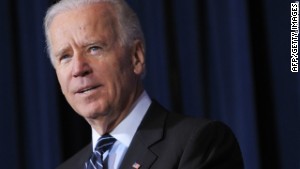 Biden: 'There is no doubt' about Syria
Biden: 'There is no doubt' about Syria 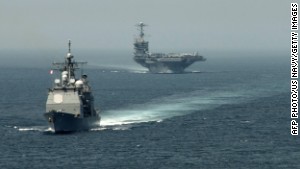 Miller: Strike will not change crisis
Miller: Strike will not change crisis 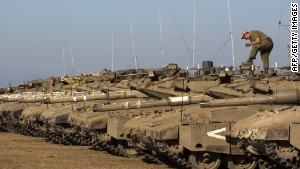 Could U.S. strike worsen Syria crisis?
Could U.S. strike worsen Syria crisis? 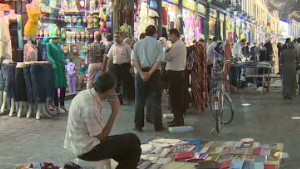 Syrians 'nervous' over possible strikes
Syrians 'nervous' over possible strikes Three decades ago, I found it shocking to learn that so much OP pesticides used annually in the United States to control insects were, chemically, close siblings to those deployed for genocidal purposes.
But then it came back as a weapon of war.
On March 16, 1988, the Iraqi government of Saddam Hussein showered the Kurdish village of Halabja with multiple chemical agents, including sarin, killing several thousand civilians. This was the largest-scale chemical weapons attack in modern history.
Seven years later, the first terrorist use of sarin occurred in Tokyo, carried out by the strange religious cult Aum Shinrikyo. On March 20, 1995, the group released sarin in the city's subway system, killing 13 people and injuring more than 6000, with many requiring hospitalization.
More recently, an apparently corrupt principal in India fed children in her school cheap, OP-contaminated lunches, killing at least 25 youngsters. Witnesses described the children's hideous deaths as the pesticides caused their nervous systems to send signals to their muscles, leading to spasms and seizures. And then, in response, their lungs became paralyzed and the terrified children gasped and suffocated until they died.
In December, The New York Times and WIRED magazine reported that the Assad government was moving some of its chemical weapons in an apparent preparation for an attack. The deadly stockpile was stored in a safe form. A launchable shell is divided in half by a thin membrane.
On one side is rubbing alcohol, on the other, methylphosphonyl difluoride. Divided, the chemicals pose no hazard and can easily be transported and stored. But upon detonation, the membrane bursts, the chemicals mix, sarin gas is made and it showers upon those unfortunates below.
In March, sarin was used in Syria in a small attack. U.N. investigators have testimony that rebel forces may have used it. This month's attacks outside of Damascus, however, was clearly carried out by the Assad regime, according to the U.S and Britain.
A year ago on August 20, President Barack Obama made his now-famous "red line" remark, stating: "We have been very clear to the Assad regime, but also to other players on the ground, that a red line for us is we start seeing a whole bunch of chemical weapons moving around or being utilized. That would change my calculus. That would change my equation."
That was the diplomatic line in the sand for the U.S. In October of the same year, Ali Akbar Salehi, Iran's foreign minister at the time, addressed the Council on Foreign Relations in New York and drew his line. I asked him, "If the Syrian government makes use of its well-known stockpiles of either biological or chemical weapons, and the wind blows said weapons across your border, claiming Iranian lives, will this be considered a national security threat?"
"Certainly, that situation is a situation that will end everything," Salehi said. Iran is the key ally of the Assad regime. But what if powerful winds were to carry sarin or other chemical weapons from Syria to the Iranian border?
Salehi added, "that is the end of the validity, eligibility, legality, whatever you name it, of that government. Weapons of mass destruction, as we said, is against humanity. It's something that is not at all acceptable. And therefore, if your hypothesis, God forbid, ever materializes, I think nobody can justify it anymore, nobody can go along with anybody who has been involved in such act of -- I would say inhuman act."
The Assad regime is playing with regional fire.
While the possibility of a wind carrying sarin to far-away Iran might be ridiculous, the Lebanese border is merely 15 miles from Damascus and Jordan's is 70 miles away.
A "new normal" has descended over the Middle East since the 2011 Arab Spring, pushing ever more dangerous boundaries of instability and brutality, mass refugee exoduses, tough military crackdowns, suicide bombings, demolition of mosques and Coptic churches and spread of diseases.
It would be nightmarish in the extreme were use of chemical weapons -- deployment for purposes of mass asphyxiation -- to join the awful "new normal" litany of despair.
Follow us on Twitter @CNNOpinion.
Join us on Facebook/CNNOpinion.
Who's to blame for student debt crisis?
Posted by Unknown
Editor's note: Ben Cohen is co-founder of Ben and Jerry's Ice Cream and founder and Head Stamper at the Stamp Stampede, which aims to build a movement to amend the Constitution to get big money out of politics. Edward Erikson is a senior associate for MacWilliams Sanders Communication.
(CNN) -- As the new school year approaches, President Obama has been traveling around talking about the high cost of education. In a speech given on August 22 in Syracuse, New York, he laid out a plan to rein in the costs, describing affordable and accessible education as "Washington's highest priority."
But the education system isn't broken -- it's "fixed." If we're serious about tackling the issue of affordable education and student debt, we need to strike at the root of the problem -- the influence of money in politics.
Private corporations like Sallie Mae -- which own 15% or $162.5 billion dollars of total student debt -- rake in private-island-purchasing profits while students suffer.
 Ben Cohen
Ben Cohen It's impossible to be on a college campus -- especially a state university -- and not notice the impact of the student debt crisis. The debt weighs on our students. It is as if you could see it in their slumping postures and staggering gaits as they haul boulders and lug chains from class to class. Approximately 37 million students currently hold debt, averaging $27,500 per person and totaling over $1.1 trillion.
 Edward Erikson
Edward Erikson Saddled with debt, students are giving up on the idea of the American Dream. You know, like the idea that you and your buddy can open up a small ice cream shop in an old gas station and grow it into a multimillion dollar business that cares for the community and delights the world.
The truth is, if Jerry and I had had $27,000 of debt in 1978, we would never have taken the risk of opening our first scoop shop. More likely than not, we would have been underemployed and buried in back payments.
Obama gets it. In Syracuse, he said: "The idea used to be that here in America anybody could make it. ... And, unfortunately, what's happened is it's gotten tougher for a lot of folks. So we've got to reverse these trends."
 Analysis of president's college plan
Analysis of president's college plan But while Obama talks about creating policies that will benefit the middle class, corporations like Sallie Mae are dedicated to preserving the status quo by showering Capitol Hill with cash.
According to the Center for Responsive Politics, Sallie Mae has donated over $1.26 million to federal candidates and parties in the last four election cycles and bankrolled $1.93 million dollars lobbying Congress in the first half 2013.
During that time, Congress crafted a student loan bill that tied interest rates to financial markets, which President Obama signed it into law in August. While in the short term, the bill prevented interest rates from doubling, students are more vulnerable in face of an adjustable interest rate that could top 8.5%.
Corporations like Sallie Mae borrow at dirt cheap interest rates (subsidized between .23% and .34%) from the Federal Home Loan banks. In contrast, undergraduate students borrow at an adjustable 3.85% and graduate students borrow at an adjustable 5.4%.
That's a sweetheart deal for Sallie Mae which raked in $2.5 billion in interest payments from student loans last year, but a terrible deal for students.
In a letter to Sallie Mae's CEO, Sen. Elizabeth Warren wrote: "While Sallie Mae is finding unique ways to profit from government programs, its borrowers are paying interest rates that are far in excess of the low cost of funds supported by the U.S. taxpayers."
It's time to dam the deluge of cash and corporate influence in Washington once and for all. Whether you're a college student, a debt holder, a parent or simply someone concerned about the future of our country, you can help.
There is a stampede rumbling across the country to amend the Constitution to declare: 1) Money is not free speech; and 2) Corporation are not people.
At StampStampede.org, we're helping to build that movement by legally stamping messages like "Not to be Used for Bribing Politicians" on our nation's currency to spread the word and get money out of politics. Every bill is seen by 875 people, so the more stamped bills that enter circulation, the more movement will grow. And it's growing.
Thanks to the leadership by groups like People for the American Way, Move to Amend, Common Cause, Free Speech for People and Public Citizen, 16 states have passed referendums calling on Congress to take action and over 150 members of Congress support the amendment strategy.
As the new school semester begins, pick up a stamp and help take back our campus and take back Congress. This is our future and our fight to win.
Follow us on Twitter @CNNOpinion.
Join us on Facebook/CNNOpinion.
Surgeons shrink Indian child's head
Posted by Unknown
Dem rep.: Learn from mistakes in Iraq
Posted by Unknown
Editor's note: Rep. Chris Van Hollen, a Democrat, represents Maryland's 8th District. Watch him on "Erin Burnett OutFront" Thursday at 7 p.m. ET.
(CNN) -- Our experience in Iraq provides three essential lessons that should guide America's response to the Syrian regime's alleged use of chemical weapons against its own people.
First, the president must present the American people and the international community with clear evidence that the al-Assad regime was responsible for the use of chemical weapons. The Bush administration took America to war in Iraq based on the false claim that Saddam Hussein had weapons of mass destruction, including stockpiles of chemical weapons.
Those false claims not only led us into a costly and unnecessary war, but did lasting damage to America's credibility. That erosion of credibility is haunting us now, as many in the international community question our claim that the al-Assad regime used chemical weapons. That makes it imperative that the Obama administration present clear and convincing evidence that the al-Assad regime was responsible for the chemical weapons use.
 Rep. Chris Van Hollen
Rep. Chris Van Hollen Second, if the Obama administration presents such evidence, it is essential that the United States and the international community take strong action to punish the regime and deter the future use of chemical weapons in Syria or elsewhere in the world. Again, the Iraq example is instructive.
Many would like to forget the fact that the United States and the international community willfully ignored Saddam Hussein's use of chemical weapons against Iran during the Iran-Iraq war and against Iraq's Kurdish population in 1988 in the aftermath of that war.
I remember those days well. Together with Peter Galbraith, my former colleague on the staff of the Senate Foreign Relations Committee, I traveled to the Iraq-Turkey border in September 1988 to investigate Saddam Hussein's chemical weapons offensive against the Kurds. We returned to Washington to urge the United States government to impose economic sanctions against Iraq for its use of chemical weapons.
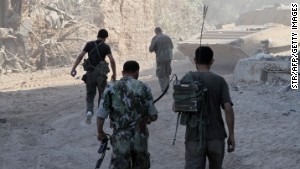 Hollen: We need more evidence in Syria
Hollen: We need more evidence in Syria  Obama: 'I have not made a decision'
Obama: 'I have not made a decision' 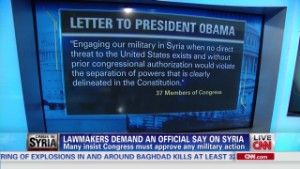 U.S. lawmakers demand say on Syria
U.S. lawmakers demand say on Syria 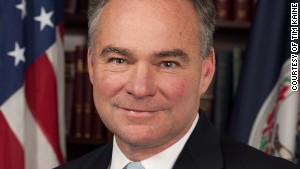 Senator to Obama: Ask Congress on Syria
Senator to Obama: Ask Congress on Syria While the United States Senate did pass such legislation, it was opposed by the Reagan administration and never made it out of the House of Representatives. Recently released CIA documents demonstrate that the Reagan administration deliberately ignored Iraq's use of chemical weapons because it favored Iraq in its war against Iran. But the failure of that sanctions legislation represented a failure of the United States to help enforce the international convention against the use of chemical weapons.
A strong case can be made that the refusal of the United States and the international community to confront Saddam Hussein for his flagrant violations of the international ban on chemical weapons emboldened him to take additional reckless actions. In 1990, he miscalculated the international response to his invasion of Kuwait.
Years later, even after he had destroyed his chemical weapons stockpile, he underestimated the depth of international concern that he was still hiding them. That is perhaps not surprising, considering that the international community did nothing when Saddam Hussein actually used chemical weapons in the 1980s.
The United States and the international community must not again stand idly by if the al-Assad regime, or another party, has used chemical weapons. It must take action to uphold international norms and send a clear signal that breaches of the international ban on chemical weapons use will not be tolerated.
Failure to act upon strong evidence will only encourage Bashar al-Assad and other international actors to use chemical weapons in the future.
The third lesson from Iraq is equally important as the first two. Our mission must be clearly defined and achievable at an acceptable cost. In 1990, President George H.W. Bush established a well defined goal -- using force to oust Saddam Hussein's forces from Kuwait. He deliberately chose not to send American troops to Baghdad to topple Saddam Hussein, because he rightfully determined that the United States would not be able to contain the violent fallout without a huge commitment of American lives and treasure.
President George W. Bush later made the mistake that his father avoided. The Iraq war clearly established that even massive U.S. troop intervention on the ground for over eight years cannot change many of the basic cultural and sectarian forces at play in the region.
Today, despite the huge sacrifice in American and Iraqi lives, Iraq is rocked by almost daily eruptions of sectarian violence. The American-backed, Shiite-dominated government of Iraq now allows Iranian planes to use its airspace to supply weapons to al-Assad and the minority Shiite Alawite sect that controls Syria.
Meanwhile, al Qaeda and Sunni extremists in Iraq are fighting to defeat the government in Baghdad as al Qaeda and Sunni extremist forces in Syria are fighting in tandem with American-supported rebels to defeat the al-Assad regime. The toxic mix of forces suggests that even a large U.S. troop presence in Syria would be unlikely to change these deep-running currents.
These lessons are important as President Obama defines the purpose of American military action in Syria in response to the use of chemical weapons. The president should make clear that the goal of our military action is to punish Syria for its blatantly illegal use of chemical weapons and to deter the future use of such weapons by the Syrian regime or others that might contemplate their use in future conflicts.
Our action should be coupled with a clear statement that any future use of chemical weapons will be met with increasing force. This goal can be reasonably accomplished by using cruise missile strikes that inflict significant pain and damage on al-Assad's forces without putting American lives in the line of fire.
Some have argued that it is pointless for the United States to engage in punitive military strikes against Syria unless our actions are designed to decisively tip the military balance toward the rebels. That claim downplays the more limited, but nevertheless important, objective of deterring the future use of chemical weapons.
Moreover, defining the success of our response as decisively changing the military balance is unrealistic, unachievable without putting American lives at risk, and will ultimately drag the United States toward full-scale intervention in a Syrian civil war.
Gen. Martin Dempsey, chairman of the Joint Chiefs of Staff, has stated that measures like the establishment of a no-fly zone would put American pilots at risk and may not change the situation on the ground.
Measuring success of these actions in terms of changing the tide of the war will lead inexorably to further assertions that American credibility is at stake and suck America into a costly civil war that could, with the current configuration of forces, result in the extremist al Qaeda elements among the rebels gaining the upper hand. That is why it is so important to define this particular mission in a way that can be achieved at an acceptable cost.
Let's heed three important lessons from Iraq: Protect our credibility by presenting clear evidence of the use of chemical weapons by the al-Assad regime; take strong action to punish the illegal use of chemical weapons and deter their future use; and define the mission in achievable terms at a cost we are willing to pay.
Follow us on Twitter @CNNOpinion.
Join us on Facebook/CNNOpinion.
Bergen: Al Qaeda's potent Syria force
Posted by Unknown
Editor's note: Peter Bergen is CNN's national security analyst, a director at the New America Foundation and the author of "Manhunt: The Ten-Year Search for bin Laden -- From 9/11 to Abbottabad."
(CNN) -- Why has the Obama administration been so reluctant to intervene in Syria? There are a host of reasons -- American fatigue with war, President Barack Obama's disinclination to start another conflict in the Middle East, and the splintered, fractured opposition to Bashar al-Assad.
But one reason looms large: al Qaeda.
Al Qaeda's affiliate in Syria, Jabhat al-Nusra, is generally acknowledged to be the most effective force fighting al-Assad.
 Peter Bergen
Peter Bergen Its fighters are willing to sacrifice themselves for the cause, are widely viewed as uncorrupt and are not involved in looting as other opposition forces are. A number of them are battle-hardened from other conflicts such as the Iraq War.
Al Qaeda's Syrian affiliate is also well supplied as it benefits from the support of Sunni ultra-fundamentalists in the wealthy Gulf states such as Qatar and Saudi Arabia.
Jabhat al-Nusra, which means the "Victory Front," was listed as a foreign terrorist organization by the U.S. State Department in December and is essentially a splinter organization of al Qaeda in Iraq.
Al-Nusra's military prowess and close ties to al Qaeda make it a potentially serious threat to U.S. interests in the region, and the group has shown it has the ability to conduct massive suicide bombings.
 A Syrian town ruled by rebels
A Syrian town ruled by rebels  Obama: 'I have not made a decision'
Obama: 'I have not made a decision'  Senator to Obama: Ask Congress on Syria
Senator to Obama: Ask Congress on Syria In November, al-Nusra claimed responsibility for 45 attacks in the provinces of Damascus, Deraa, Hama and Homs that killed dozens of people, including one suicide bomb that reportedly resulted in 60 casualties.
It was the first insurgent organization in Syria to claim responsibility for attacks that caused civilian casualties.
Despite these civilian casualties, the group has been able to garner considerable support from Syria's Sunni population, not only because it is the premier fighting force in the campaign to topple al-Assad but also because it is involved in providing critical services such as food, medical services and Sharia courts to the embattled population.
Also, for the moment, al-Nusra is not imposing Taliban-style rule in areas that it controls as al Qaeda did in Iraq's massive Anbar province during the first years of the Iraq War. Al Qaeda's harsh rule in Iraq precipitated the 2006 "Sunni Awakening" in which Iraq's Sunni tribes rose up against the group.
Al-Nusra seems to have learned from this mistake and is operating in a Hezbollah-like manner as a large-scale provider of social services, and with the consent of the population in the areas it controls.
There is some confusion about how exactly al-Nusra fits into the larger al Qaeda network.
Al Qaeda in Iraq released a statement in April announcing its official merger with al-Nusra, proclaiming that their joint organization would be called the Islamic State of Iraq and the Levant. A leader of al-Nusra later rejected the merger but pledged the group's support for al Qaeda's overall leader, Ayman al-Zawahiri.
On June 9, Al Jazeera obtained a copy of a letter from al-Zawahiri annulling the merger.
But a week later, in an audio recording posted online, al Qaeda in Iraq rejected al-Zawahiri's annulment of the merger, likely adding to the confusion of al Qaeda cadres.
Syria is a particularly agreeable environment for al Qaeda. During the Sunni insurgency in Iraq that began in 2003, it was a key base for training and supporting foreign fighters.
Al-Assad is also the perfect al Qaeda villain. He is an Shia Alawite and therefore a heretic in the eyes of the Sunni fundamentalists. He is a secularist and therefore an apostate in their view, and he is conducting a war without quarter against much of his Sunni population.
Some 2,000 to 5,500 foreign fighters are believed to have traveled to Syria since the beginning of the Syrian conflict to join the rebels who aim to topple the Assad regime.
Not all of them have necessarily joined jihadist factions of the rebel forces, but because most foreign fighters are drawn to the conflict because of a perceived religious responsibility, it is likely that these groups have drawn the lion's share of the foreigners.
Even at high-end estimates, foreign fighters make up a small portion of the forces arrayed against the Assad regime: no more than 10%.
Al-Nusra is the opposition group in Syria that attracts the most foreign fighters. It is believed that there are about 100 foreign fighters from the United Kingdom fighting in Syria.
Experts say the number of Americans fighting in Syria is likely less than 10, and only a couple of instances of Americans fighting with al-Nusra have been confirmed.
Eric Harroun, a former American solider, was charged in 2013 with conspiring to use a rocket-propelled grenade in Syria, and he admitted to fighting with al-Nusra.
Follow us on Twitter @CNNOpinion.
Join us on Facebook/CNNOpinion.